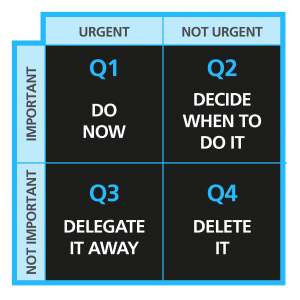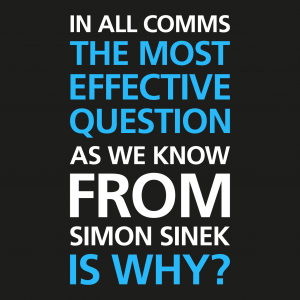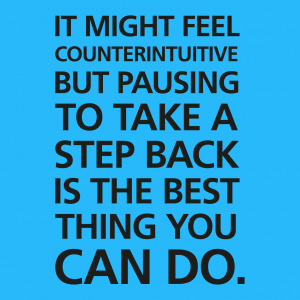We are in the midst of a global pandemic, locked down yet laden with the responsibility of keeping the comms flowing (and the kids happy too).
And with the overwhelming amount of communications surrounding this war on Covid-19, the ability for people to differentiate between urgent and important is more essential than ever.
What can wait? And what must be done NOW?
The difference between urgent and important tasks
“What is important is seldom urgent and what is urgent is seldom important. Most things which are urgent are not important, and most things which are important are not urgent.”
This statement was delivered in a 1954 speech by former U.S. President Dwight D. Eisenhower.
This ‘Eisenhower Principle’ is said to be how he organised his workload and priorities.
He recognised that great time management means being effective as well as efficient.
In other words, we must spend our time on things that are important and not just the ones that are urgent.
And to do this, we need to understand the difference:
- Important activities have an outcome that leads to us achieving a specific goal.
- Urgent activities are often the ones we concentrate on and they demand attention because the consequences of not dealing with them are immediate.
When we know which tasks are important and which are urgent, we can overcome the tendency to focus on unimportant things.
And right now, being able to differentiate between the two is crucial.
When you’re up against it, take your list of tasks for the day and try plotting them on the Eisenhower Matrix.

Important and urgent
These are do it now jobs that are unavoidable. Much like the current coronavirus situation, you can’t always predict or avoid them but you’ll be seeing a lot of them right about now.
Important but not urgent
These are the activities that help you achieve the goal, and complete important work. They’re important, but can they wait? They’re often the tasks that need to be planned in for another time.
Urgent but not important
These tasks are things that prevent you from achieving your goals. Ask yourself whether you can reschedule or delegate them if you can.
Not important and not urgent
Some of these may be activities that others want you to do, even though they don’t contribute to the desired goal. These activities are just a distraction – avoid them where possible. Right now, you can simply ignore or eliminate many of them. This is where your skill of saying ‘no’ will really come into play.
When urgent really means urgent
When the deadline for current NHS comms materials was set for ‘yesterday’ in this case, it really meant just that.
We offered to help our amazing comms colleagues in the NHS and were delighted to be able to turn things around speedily for them. The urgency was clear from the start. A definite do it now job.
Start with why
In all comms the most effective question, as we know from Simon Sinek, is Why? If someone tells you something is urgent, chances are they mean it’s important. Seeking clarification of what is needed and why offers a chance to clarify the real need.
Understanding if it’s for someone with a boss breathing down their neck or it’s a group of nurses desperate to keep themselves safe on the frontline allows recognition of the level of priority.
Always start with the question why.
How urgent is urgent?
There are varying levels of urgency – communicating lockdown procedures required immediate comms for example. However, announcing that the quarter results are down isn’t urgent in the eyes of those whose lives are about to change or be impacted greatly.
Key attributes of an internal communicator are empathy and the ability to see the wider picture before rushing into a communication that has a very real impact on people’s lives. Being perceptive and aware of the fact sending staff home not knowing what might happen to your company in the months that follow will determine if urgent really is urgent.
Conflicting information can be unnerving
In the midst of something of the scale of the coronavirus there is bound to be conflicting information. Especially when it’s a moving target. Here’s the scenario: You have just got your communications ready and signed off when the Government change the goalposts. Is this the point where you still hit send? Or delay the comms and go through the lengthy process again?
It might feel counterintuitive but pausing to take a step back is the best thing you can do.
Using all necessary channels to ensure that other comms haven’t gone out recently would be a great sanity check. Ask what information people feel they need rather than assuming you know what they need. In addition to what they’re being fed on media channels, what more do they need from you to feel they have all the necessary information. Do they need the information urgently? Or are you sending it because it’s believed to be the right thing to do?
Stop, think and remember that a single source of truth is what people need right now.
Remember your plan… what are your objectives?
Grab your plan and see how does the requested communication align with what else is going out that day, week or month?
Having a plan not only gives you credibility, but confidence to challenge as you have evidence to back up your argument.
Crisis can be enlightening
Working on urgent NHS comms over the last few days has been fulfilling for us, despite it being for difficult reasons. And it’s been an opportunity to really focus the mind, reminding us that to see a path through the woods we first need to stop and identify the trees in front of us.
We have enjoyed playing our part in the fight against coronavirus. And what we have noticed is our teams’ determination to pull together in this time of uncertainty where knowing what’s urgent really matters.
















